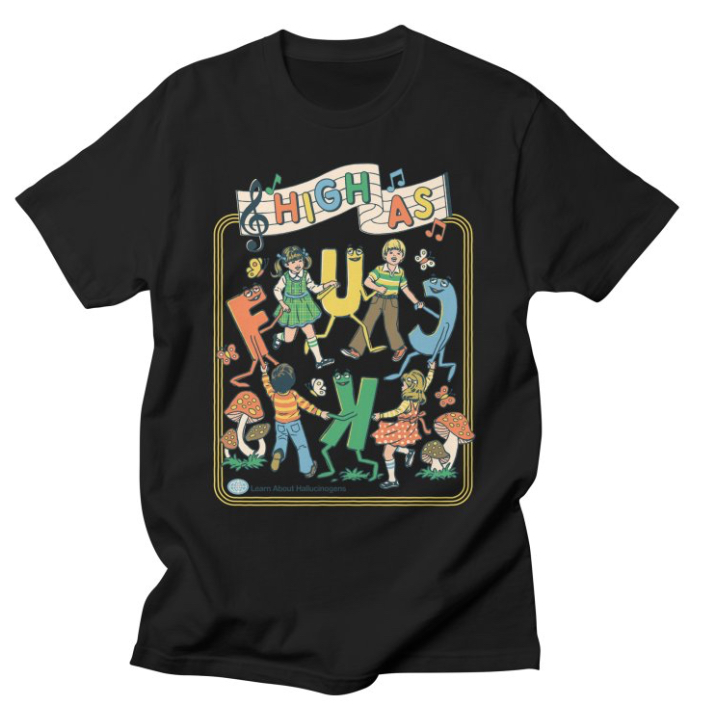In the vast and ever-evolving landscape of fashion, certain designers stand out not just for their creativity, but for their ability to challenge societal norms and push the boundaries of what is considered acceptable. Steven Rhodes, known as the “Master of the Dark T-Shirt Arts,” is one such figure. Through his unique blend of sardonic humor, retro style, and dark themes, Rhodes has carved out a niche in the fashion world that appeals to those who appreciate the eerie, the ironic, and the downright weird. His t-shirts are more than just clothing; they are statements, reflections of a subculture that revels in the absurdity of modern life.
The Aesthetic of Nostalgia: Retro Meets Dark Humor
Steven Rhodes’s designs are instantly recognizable, not just for their humor but for their distinct aesthetic, which draws heavily on the visual styles of the 1970s and 80s. This era, often associated with innocence, simplicity, and wholesome family entertainment, is reimagined in Rhodes’s work as a vehicle for subversive and darkly humorous commentary. His designs are reminiscent of children’s activity books, old-school sci-fi, and campy horror comics—mediums that once served as cultural staples of these decades. By repurposing these familiar styles, Rhodes taps into a collective nostalgia, but with a twist: the seemingly innocent imagery is juxtaposed with dark, ironic, and often unsettling messages.
Take, for example, one of his most popular designs, the “Don’t Talk to Strangers Alien Retro Dark Humor T-Shirt.” At first glance, the design seems like a harmless, kitschy throwback to a time when public service announcements were delivered through cheerful illustrations. However, the image of a friendly-looking alien paired with the cautionary slogan “Don’t Talk to Strangers” introduces a sinister layer of meaning. In Rhodes’s hands, the cheerful retro aesthetic becomes a mask for darker, more cynical observations about the world we live in today. The design plays on the familiar trope of “stranger danger,” but with an extraterrestrial twist that both amuses and unsettles.
This blending of retro visuals with dark humor is what sets Rhodes apart from other contemporary designers. His work is a commentary on the dissonance between the past and the present, between what we remember and what actually was. The use of vintage styles serves not just as a homage to a bygone era, but as a critique of the idealized narratives often associated with it. By subverting these nostalgic images, Rhodes challenges the viewer to confront the darker realities that lie beneath the surface of our collective memories.
Humor as a Tool for Social Commentary
Humor has long been a powerful tool for social critique, and Steven Rhodes’s work exemplifies this tradition. His t-shirts are not just funny—they are biting, satirical commentaries on modern life. The humor in his designs is often dark, sometimes even macabre, but it is always sharp. Whether he is poking fun at societal norms, questioning authority, or simply reveling in the absurd, Rhodes uses humor to make his audience think.
The “Don’t Talk to Strangers” design, for instance, is more than just a funny t-shirt. It is a commentary on the culture of fear that permeates modern society, particularly in the context of childhood. The slogan itself, a staple of parental advice for generations, takes on a new meaning when paired with the image of an alien. In this context, the advice seems almost ludicrous—what child would take a warning against talking to aliens seriously? Yet, beneath the absurdity lies a critique of the way fear is used to control behavior, both in children and in society at large. By exaggerating this fear to the point of absurdity, Rhodes highlights its irrationality, encouraging viewers to question the motives behind such warnings.
This use of humor to critique societal norms is a recurring theme in Rhodes’s work. His designs often play with ideas of conformity, authority, and the expectations placed on individuals by society. By framing these critiques in the language of humor, Rhodes makes them more palatable, but no less powerful. The laughter his designs evoke is often accompanied by a sense of discomfort, a recognition that the joke is not just funny, but also true. This is the hallmark of effective satire: it entertains, but it also provokes thought.
The Cult of the T-Shirt: Fashion as Identity
One of the most fascinating aspects of Steven Rhodes’s work is the way it has resonated with a wide audience. His t-shirts have gained a cult following, with fans collecting his designs and wearing them as part of their personal style. This popularity speaks to the power of the t-shirt as a medium for self-expression. In a world where fashion is often dictated by trends and brands, Rhodes’s t-shirts offer a way for individuals to assert their identity, to declare their membership in a subculture that values irony, wit, and a healthy dose of weirdness.
The t-shirt, as a fashion item, has always had a unique place in popular culture. Unlike other forms of clothing, it is both utilitarian and symbolic. A t-shirt is comfortable, practical, and accessible to everyone, but it is also a canvas, a way to broadcast a message to the world. For decades, people have used t-shirts to express their beliefs, affiliations, and interests. From band logos to political slogans, the t-shirt is a powerful tool for communication.
Steven Rhodes understands this power, and he uses it to full effect. His designs are not just about aesthetics—they are about sending a message. When someone wears a Steven Rhodes t-shirt, they are not just wearing a piece of clothing; they are making a statement. Whether that statement is “I appreciate dark humor,” “I question societal norms,” or simply “I like weird stuff,” it is a declaration of identity. This is what makes Rhodes’s work so compelling: it allows people to express themselves in a way that is both stylish and meaningful.
The Dark Side of Nostalgia: Subversion and Critique
Nostalgia is a powerful force, but it is also a double-edged sword. While it can provide comfort and a sense of connection to the past, it can also obscure the less pleasant aspects of that past. Steven Rhodes’s work taps into this tension, using nostalgia as a tool for subversion and critique. By reinterpreting the visual language of the 70s and 80s, Rhodes forces his audience to confront the darker side of the eras they remember so fondly.
The retro aesthetic of Rhodes’s designs is instantly recognizable, evoking memories of a simpler time. However, this simplicity is deceptive. The bright colors, cheerful illustrations, and wholesome themes of the 70s and 80s were often used to mask the complexities and contradictions of the era. Beneath the surface of this nostalgic imagery lies a darker reality—one that Rhodes brings to light through his work.
For example, the “Don’t Talk to Strangers” t-shirt plays on the idea of childhood innocence, but it does so in a way that highlights the absurdity of the fears we impose on children. By placing an alien in the role of the “stranger,” Rhodes exaggerates the fear to the point of absurdity, revealing the underlying irrationality. This subversion of nostalgic imagery is a recurring theme in Rhodes’s work. He uses it to critique not just the past, but also the way we remember the past. In doing so, he challenges his audience to question the narratives they have been told, to look beyond the comforting surface and see the complexities beneath.
Steven Rhodes: Mastering the Art of Dark T-Shirts
Steven Rhodes’s rise to prominence as the “Master of the Dark T-Shirt Arts” is a testament to his ability to tap into the zeitgeist. His designs resonate with a generation that values irony, wit, and a healthy skepticism of authority. In a world where fashion is often about conforming to trends, Rhodes offers an alternative—a way to stand out, to express individuality, and to make a statement. His work is a celebration of the weird, the dark, and the humorous, and it speaks to the inner weirdo in all of us.
But more than that, Rhodes’s work is a critique of the world we live in. Through his t-shirts, he comments on the absurdity of modern life, the irrationality of societal norms, and the contradictions of nostalgia. His designs are funny, yes, but they are also thought-provoking. They challenge us to question our assumptions, to see the world in a different light. In this way, Steven Rhodes is not just a designer—he is a social commentator, using humor and art to provoke thought and spark conversation.
Steven Rhodes’s t-shirts are more than just fashion items—they are cultural artifacts, reflections of a subculture that values wit, irony, and a dark sense of humor. His work is a reminder that fashion is not just about looking good; it is about expressing identity, challenging norms, and making a statement. In a world that often takes itself too seriously, Rhodes’s t-shirts offer a welcome dose of humor, a way to laugh at the absurdity of it all.
As the “Master of the Dark T-Shirt Arts,” Steven Rhodes has created a body of work that is both visually striking and intellectually stimulating. His designs are a testament to the power of humor as a tool for social critique, and they serve as a reminder that sometimes, the best way to understand the world is to laugh at it. Whether you are a fan of retro aesthetics, dark humor, or just appreciate a good t-shirt, Steven Rhodes’s work is sure to resonate.
No comments yet.








